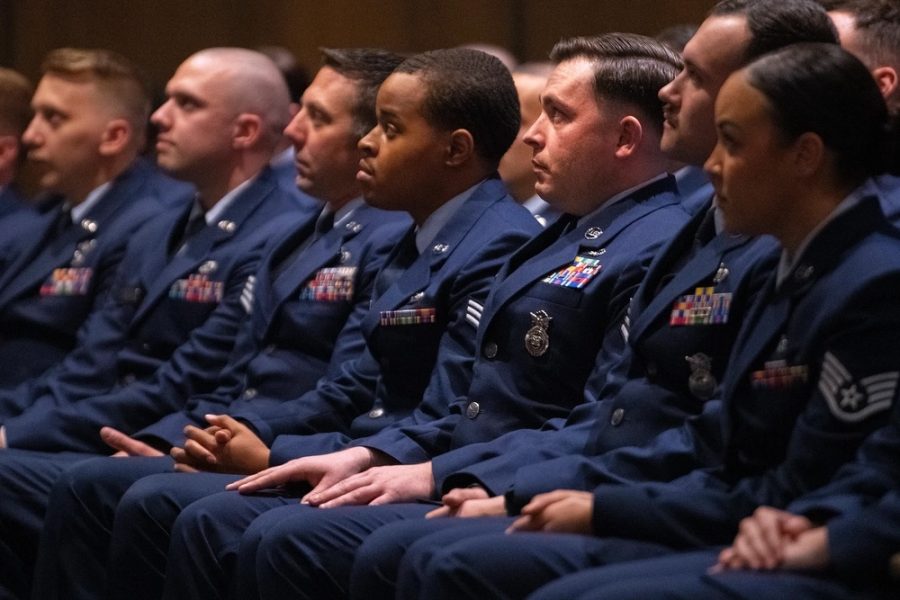Air University formed a task force last month to address the lengthy delays in processing official transcripts and graduations from the Community College of the Air Force (CCAF), following months of mounting frustrations for Airmen.
The average processing time for official transcripts used to be 72 hours, an official told Air & Space Forces Magazine. The goal is now 14 days for high-priority requests and 90 days or more for other requests. Priority requests are ones that have implications for promotions, commissioning, developmental special duties, retirements, or separations.
The CCAF website says the current wait time is 150 days for processing transcripts coming into the college and 85 for those being sent to a third party such as an educational institution or employer. By comparison, civilian universities often process transcripts in one to five days.
“Our eventual goal is to be in line with the civilian standard, so that within a 72-hour turn time, you’d be able to get a transcript request,” Col. Damian Schlussel, head of the Thomas N. Barnes Center for Enlisted Education, told Air & Space Forces Magazine.
CCAF offers associate degrees and professional credentialing programs for enlisted Airmen and Guardians. Last June, the college launched the Air University Student Information System (AU SIS), which was supposed to replace a dozen outdated systems and make it easier for students and educators to check academic progress.
But after the switch, the data coming out of AU SIS proved to be inaccurate. Schlussel likened it to patching a software update on an iPhone—except here, the system is connected with legacy systems that are also being updated, so that “every time we push a patch or an update, sometimes the code that underlies the digital backbone needs to be tweaked.”
In the meantime, every request has to be processed by hand, with program managers validating every line of every transcript, from the student’s name to the courses they have taken to their number of credit hours. While the new system is not specific to CCAF, the college has a much higher number of degrees to process than other institutions at Air University. On a typical day, CCAF processes about 500 requests, but with about 400,000 total force enlisted Airmen and Guardians around the world and 22,000 degrees a year, a backlog was inevitable.
“We’re getting more requests than what we can manually stay up to speed with, or ‘hand jam’ to ensure data accuracy,” Schlussel said.
Airmen and Guardians have noticed, with many airing their frustrations on social media. Several described losing out on scholarships because the application deadline passed while waiting on a CCAF transcript. When asked if there have been consequences amidst the rocky transition, Schlussel, who took command at Barnes a week after AU SIS came online, said he and his team are “more concerned with how we can make improvements into the future,” rather than “worrying about what got us here.”
Part of the objective of the new task force, which began Jan. 8 and was announced Jan. 30, is to figure out lessons learned from the experience. The task force is consulting with industry experts on resolving the technical and software issues, Schlussel said in a press release.
“Nothing is off the table,” he told Air & Space Forces Magazine. “We want to make sure that we hold faith with promises made to our Airmen for what CCAF could and should be. Whether it is help from the larger Air Force or contracting solutions, we are looking at all of those options and abilities through Air University.”
Besides fixing AU SIS, the task force has a range of other efforts, such as streamlining the user experience by making Air University online systems easier to understand and reducing the number of clicks needed to navigate them; consolidating registrar offices; working on a regular five-year re-accreditation process; and improving communications with Airmen past and present.
“We want to have better communications about what is happening, what the current problems are, what you can expect, and when things are going to get better,” Schlussel said.
The colonel advised troops affected by the delay to consult their chain of command.
“If an Airman is being adversely affected by what is going on with CCAF, their squadron or group leadership have the ability to reach out directly to us and we can adjust an Airman’s priorities based on that input,” he said. “I really encourage folks to use their chain of command.”
The CCAF transcript issue is one of several technological frustrations Airmen have dealt with in recent years. Others include a buggy ‘myDecs’ platform for approving decorations that was recently replaced, and a malfunctioning ‘myEval’ evaluation platform that was relaunched in May after the branch stopped using it in 2022.
Brian Ferguson, a spokesperson for the Barnes Center, which oversees CCAF and enlisted Professional Military Education, said Air University staff and leadership are working as hard as they can to fix the transcript issue.
“I know it sounds cliché, but this is a top priority here,” coming from “an individual concern for the service member out there,” he said.
Editor’s Note: The original version of this article misidentified some degrees offered by the Community College of the Air Force. It was updated Feb. 5 to correct the error.

